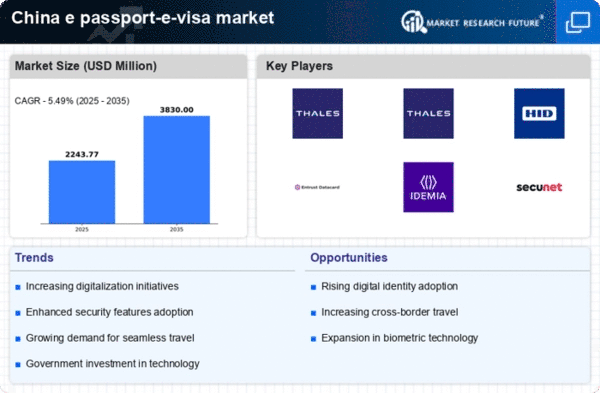Growing Awareness of Digital Solutions
There is a growing awareness of digital solutions among travelers in China, which is positively impacting the e passport-e-visa market. As more individuals become familiar with the benefits of digital applications, such as ease of use and faster processing times, the demand for e passports and e visas is likely to increase. Educational campaigns and government outreach programs are helping to inform the public about the advantages of transitioning to digital formats. By 2025, it is anticipated that at least 60% of travelers will prefer digital solutions for their travel documentation, reflecting a significant shift in consumer behavior. This trend suggests that the e passport-e-visa market will continue to expand as awareness and acceptance of digital solutions grow.
Rising Demand for Secure Travel Solutions
The e passport-e-visa market in China is experiencing a notable surge in demand for secure travel solutions. As international travel continues to expand, travelers are increasingly concerned about the safety and security of their personal information. The integration of biometric technologies, such as facial recognition and fingerprint scanning, is becoming a standard in e passports and e visas. This trend is driven by the need to enhance security measures and streamline border control processes. In 2025, it is estimated that the adoption of biometric passports in China will reach approximately 80%, reflecting a significant shift towards more secure travel documentation. Consequently, the e passport-e-visa market is likely to benefit from this heightened focus on security, as both government agencies and travelers prioritize the protection of sensitive data.
Increased International Travel and Tourism
The e passport-e-visa market in China is poised for growth due to the anticipated increase in international travel and tourism. As travel restrictions ease and global tourism rebounds, more Chinese citizens are expected to travel abroad. This trend is likely to drive the demand for e passports and e visas, as travelers seek convenient and efficient ways to manage their travel documentation. In 2025, it is estimated that outbound tourism from China will reach over 200 million trips, creating a substantial market for e passport and e visa services. The convenience of digital applications and the ability to store travel documents electronically are appealing features that may further encourage adoption among travelers, thereby bolstering the e passport-e-visa market.
Technological Advancements in Document Verification
Technological advancements in document verification are significantly influencing the e passport-e-visa market in China. Innovations such as artificial intelligence and machine learning are being integrated into the verification processes, enhancing the accuracy and efficiency of identity checks. These technologies allow for real-time analysis of travel documents, reducing the risk of fraud and ensuring that only legitimate travelers are granted access. As of 2025, it is expected that the implementation of these advanced verification systems will increase the reliability of e passports and e visas, thereby fostering greater trust among users. This trust is essential for the continued growth of the e passport-e-visa market, as both travelers and government authorities seek to ensure the integrity of travel documentation.
Government Initiatives to Modernize Travel Infrastructure
In China, government initiatives aimed at modernizing travel infrastructure are playing a crucial role in the growth of the e passport-e-visa market. The Chinese government has been investing heavily in upgrading its border control systems and enhancing the efficiency of visa processing. This modernization effort includes the implementation of advanced technologies that facilitate faster processing times and improved user experiences. For instance, the introduction of automated border control gates has reduced wait times for travelers, thereby increasing the attractiveness of e passports and e visas. As of 2025, it is projected that the government will allocate over $500 million towards these initiatives, further solidifying the e passport-e-visa market's position as a vital component of China's travel ecosystem.
















